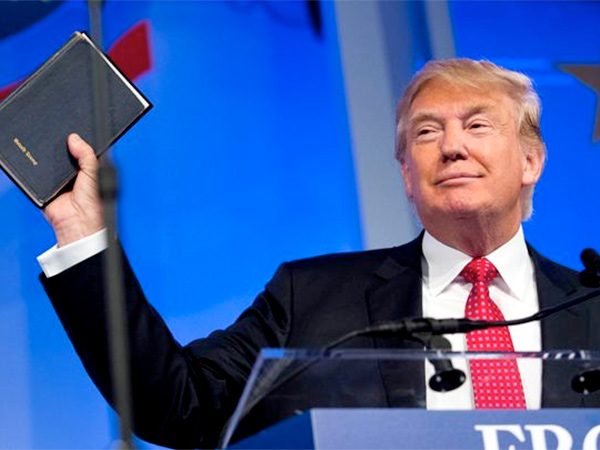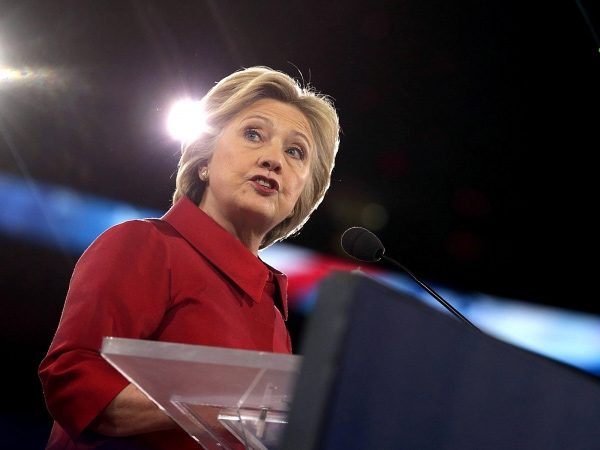 BOB ABERNETHY, host: Donald Trump and Republican leaders in Congress met this past week hoping to find unity in their divided party. New data show Trump faces big challenges among a core GOP constituency—evangelicals. While some evangelicals give Trump strong support, several new surveys have found significant numbers of them who said they would “never” vote for Trump. Many said they would instead vote for a third-party or write-in candidate. Meanwhile, this week Trump got into a social media “war of words” with prominent Southern Baptist leader Russell Moore. Moore has been critical of Trump’s character and rhetoric. Trump tweeted that Moore is a “nasty guy with no heart.”
BOB ABERNETHY, host: Donald Trump and Republican leaders in Congress met this past week hoping to find unity in their divided party. New data show Trump faces big challenges among a core GOP constituency—evangelicals. While some evangelicals give Trump strong support, several new surveys have found significant numbers of them who said they would “never” vote for Trump. Many said they would instead vote for a third-party or write-in candidate. Meanwhile, this week Trump got into a social media “war of words” with prominent Southern Baptist leader Russell Moore. Moore has been critical of Trump’s character and rhetoric. Trump tweeted that Moore is a “nasty guy with no heart.”
Joining me now with more on all of this is our managing editor, Kim Lawton. Kim, welcome. You’ve been talking to a lot of evangelicals. What’s the big problem? Is it Trump’s character?
KIM LAWTON: For many of them it is his character—not just his marital background and his casino ownership, but for some of them it’s how he has talked about religion. This is a man who has said he doesn’t have to ask God for forgiveness, who has referred to communion as a little cracker, and so there is some of that. Some of his positions in the past on issues—for example, abortion—have evolved, and that makes some of them uneasy. Some of them also don’t like his rhetoric, his rhetoric about immigrants and women and Muslims. And for some evangelicals that’s an issue as well.
 ABERNETHY: And some, I’ve read, see him as evil.
ABERNETHY: And some, I’ve read, see him as evil.
LAWTON: Well, some of it has been characterized as, you know, we have a choice of voting for the lesser of two evils. Many of these people are also not fans of Hillary Clinton, and so faced with that kind of a decision—that’s a big debate. And a very interesting debate to me that I’m seeing on social media and some of the evangelical blogs, people talking about what do we do? We don’t really want to support Hillary Clinton, although some people say they will. So they’re talking about maybe voting for a third party candidate, maybe writing in a vote, or maybe just staying home from the election altogether. Now there are some who also have made a decision, somewhat reluctantly, they will support Trump. So it’s all over the map, which makes it very interesting.
ABERNETHY: And this a very important constituency for anybody on the religious right, isn’t it?
LAWTON: For the Republican Party the evangelical constituency has been a core group, not just because they vote reliably Republican. The majority of them vote Republican. But many of them have been very active in the trenches as well. Getting out their neighbors to vote, talking about things in their churches, volunteering in the campaigns and this has always been a bit of a problem for the GOP establishment. On the one hand, they need these people. Sometimes they wish the evangelicals weren’t so vocal. So it’s always been a little bit of a tough issue for them. But nonetheless they have needed this community in order to put together a winning coalition.
ABERNETHY: Kim Lawton, many thanks.

 BOB ABERNETHY, host: Donald Trump and Republican leaders in Congress met this past week hoping to find unity in their divided party. New data show Trump faces big challenges among a core GOP constituency—evangelicals. While some evangelicals give Trump strong support, several new surveys have found significant numbers of them who said they would “never” vote for Trump. Many said they would instead vote for a third-party or write-in candidate. Meanwhile, this week Trump got into a social media “war of words” with prominent Southern Baptist leader Russell Moore. Moore has been critical of Trump’s character and rhetoric. Trump tweeted that Moore is a “nasty guy with no heart.”
BOB ABERNETHY, host: Donald Trump and Republican leaders in Congress met this past week hoping to find unity in their divided party. New data show Trump faces big challenges among a core GOP constituency—evangelicals. While some evangelicals give Trump strong support, several new surveys have found significant numbers of them who said they would “never” vote for Trump. Many said they would instead vote for a third-party or write-in candidate. Meanwhile, this week Trump got into a social media “war of words” with prominent Southern Baptist leader Russell Moore. Moore has been critical of Trump’s character and rhetoric. Trump tweeted that Moore is a “nasty guy with no heart.” ABERNETHY: And some, I’ve read, see him as evil.
ABERNETHY: And some, I’ve read, see him as evil.




